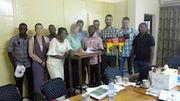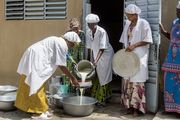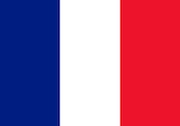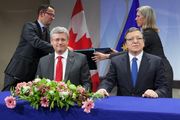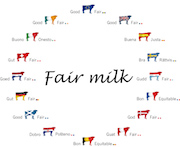EMB Newsletter June 2016
Newsletter as PDF
Contact
EMB - European Milk Board asbl
Rue de la Loi 155
B-1040 Bruxelles
Phone: +32 - 2808 - 1935
Fax: +32 - 2808 - 8265
Dear dairy farmers and interested parties,
The situation on the European milk market continues to deteriorate and the decisions and measures adopted by the Commission in March have proven to be - as was clear to see from early on - ineffective and inappropriate as a way out of the current crisis.
The situation in Europe is drastic: Milk prices paid to producers are well below production costs and there is no hope of sustained improvement in the coming months.
The situation in Italy mirrors the rest of Europe: An increase in milk volume (around 2%) and in production of cheese without protected designation of origin (which has however gone into storage on a large scale due to shrinking demand) has led to a collapse of prices. The farms that continue to survive are the ones that concluded production contracts in December 2015 and January 2016 at 31-33 cents. The spot price for milk is currently in a free fall and individual prices below the 20-cent mark have been recorded. We are seeing a clear downward trend and things will only get harder as of June when the contracts signed in December and January will expire.
Good news from Luxembourg: The 3rd European Fair Milk Conference will take place this year on June 30 and July 1 in Ettelbruck. After the success of the Conference last year during the EXPO in Italy, this year will look at the results achieved so far and determine the future direction of the event. This year as well, the "Golden Faironika" will be awarded to policy-makers, organisations and farmers who have contributed to improvements in the dairy sector.
The EMB will continue to fight for a fair milk price and a European volume control system for producers.
Roberto Cavaliere, EMB advisory board member and president of APL Italy
The milk volume must be cut!
United for a responsible dairy policy!
Current projects: Support for local dairy farmers in Burkina Faso and Zambia
The milk crisis in France - Analysis and details of possible solutions
TTIP and CETA: Attacks on the milk market
Trading away our farmers
Third European Fair Milk Conference
Impressum
European Milk Board asbl
Rue de la Loi 155
B-1040 Bruxelles
Phone: +32 2808 1935
Fax: +32 2808 8265
E-Mail: office@europeanmilkboard.org
Website: http://www.europeanmilkboard.org


